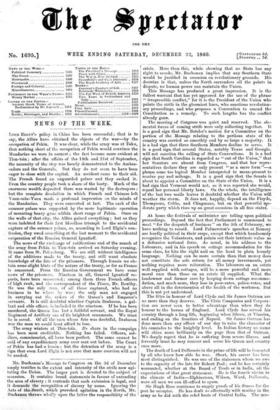NEWS OF THE WEEK.
LORD Exorses policy in China has been successful ; that is to say, the Allies have obtained the objects of the war—by the occupation of Pekin. It was clear, while the army was at Taku, that nothing short of the occupation of Pekin would oonvince the Mandarins we were in earnest ; the fact became more evident at Tien-tsin; after the affairs of the 18th and 21st of September, the necessity of the step was hourly demonstrated to the Ambas- sadors and the Generals. But they do not seem to have been eager to close with the capital. An accident came to their aid. The French found an unguarded palace and they sacked it. Even the country people took a share of the booty. Much of the enormous wealth deposited there was wasted by the destroyers ; but the complete desolation in which French and Chinese left, Yuen-min-Yuen made a profound impression on the minds of the. Mandarins. They were converted at, last. The sack of the summer palace was supported by the more legitimate operation of mounting heavy guns within short range of Pekin. Once on the walls of that city, the Allies gained everything ; but as they were indebted for their first bloodless triumph to the accidental capture of the summer palace, so, according to Lord Elgin's con- fession, they owed something at the last moment to the accidental cooperation of the Russian General Ignatieff.
The news of the exchange of ratifications and of the march of the army from Pekin to Tien-tsin arrived on Saturday evening. It came from St. Petersburg. We are still without intelligence of the additions made to the treaty, and still want absolute knowledge of the fate of the prisoners. Through Russia we ob- tain seine slight hints of the nature of the treaty, so far as France is concerned. From the Russian Government we have some news of the prisoners. Nineteen in all, General Ignatieff re- ports, have been massacred; among them three French officers of high rank, and the correspondent of the Times, Mr. Bowlby. He was the only man, of all those captured, who had no business to be where he was ; the only man not engaged in carrying out the orders of the Queen's and Emperor's servants. It is still doubtful whether Captain Brabazon, a gal- lant and able officer, is included in the nineteen. If he has been murdered, the Queen has lost a faithful servant, and the Royal Regiment of Artillery one of its brightest ornaments. We trust lie is saved. Of all the men whose fate was doubtful, Brabazon was the man we could least afford to lose.
The army winters at Tten-tsin. Its share in the campaign has been most creditable. Nothing has failed. Officers, sol- diers, commissariat, all have been perfect. The same cannot be said of any expeditionary army ever sent out before. The Court of Pekin has had a lesson ; but the detention of the army is a sign that even Lord Elgin is not sure that more coercion will not be needed.


























